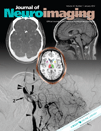Diffusion Tensor Imaging of Corpus Callosum Integrity in Multiple Sclerosis: Correlation with Disease Variables
J Neuroimaging 2012;22:33-37.
Abstract
ABSTRACT
BACKGROUND AND PURPOSE
Corpus callosum (CC) is frequently involved in multiple sclerosis (MS). We aimed to investigate the relations between CC microstructure integrity as measured by diffusion tensor imaging (DTI) in relapsing-remitting MS patients with low neurological disability in comparison with age-matched healthy subjects and further to identify correlations between DTI-CC parameters and clinical variables of MS disease activity.
METHODS
CC volume was measured on 3.0T brain MRI by MS Analyze software. DTI metrics acquired along 31 independent directions were obtained and fractional anisotropy (FA), apparent diffusion coefficient (ADC), longitudinal (λ1) and transverse (λ 2, λ 3) diffusivities were measured in MS patients and healthy subjects. Disease activity was assessed by relapse rate and neurolgical disability by the Extended Disability Status Scale (EDSS).
RESULTS
Thirty relapsing-remitting MS patients and 30 age- and sex-matched healthy subjects were studied. CC volume and DTI metrics differed significantly between MS patients and healthy subjects. In MS patients, all DTI parameters correlated with neurological disability. ADC, longitudinal and transverse diffusivity correlated with disease duration. ADC and the transverse diffusivity correlated with relapse rate.
CONCLUSIONS
CC DTI parameters, especially ADC and transverse diffusivity correlated with disease variables especially with those associated with clinical activity.




